Archive for October 16th, 2009
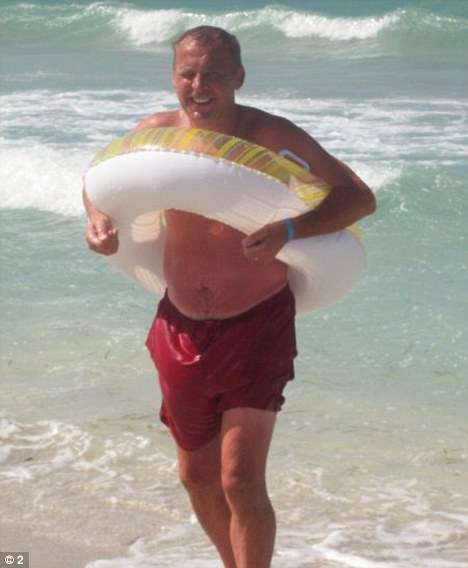
UK tabloid exposes Bridger
 (CNS): Just when Cayman thought the situation regarding Operation Temupra and the Special Police Investigation Team (SPIT) couldn’t get any worse, a leading British tabloid is running an exposé in its Saturday edition which reveals the fiasco in lurid details. The Daily Mail, which has a circulation of around 2.2 million (some 4 million readers), has managed to secure pictures of SPIT at work and play that offers more on the real story of the so called corruption investigation than hitherto realised. Daily Mail journalist Stephen Wright reveals that Scotland Yard is also refusing to take responsibility for the $7milllion failed investigation. (Photo: SIO Martin Bridger runs along SMB wearing rubber ring)
(CNS): Just when Cayman thought the situation regarding Operation Temupra and the Special Police Investigation Team (SPIT) couldn’t get any worse, a leading British tabloid is running an exposé in its Saturday edition which reveals the fiasco in lurid details. The Daily Mail, which has a circulation of around 2.2 million (some 4 million readers), has managed to secure pictures of SPIT at work and play that offers more on the real story of the so called corruption investigation than hitherto realised. Daily Mail journalist Stephen Wright reveals that Scotland Yard is also refusing to take responsibility for the $7milllion failed investigation. (Photo: SIO Martin Bridger runs along SMB wearing rubber ring)
Bound to create further uproar locally, the pictures of one detective sleeping as his desk, Bridger on board his boat, as well as those of his apartment which was paid for out of the Cayman purse, along with SPIT drinking and partying, suggest that what the Daily Mail has knicknamed the ‘Sunshine Squad’ may not have been as committed to the integrity of the investigation as Governor Stuart Jack has led Cayman to believe.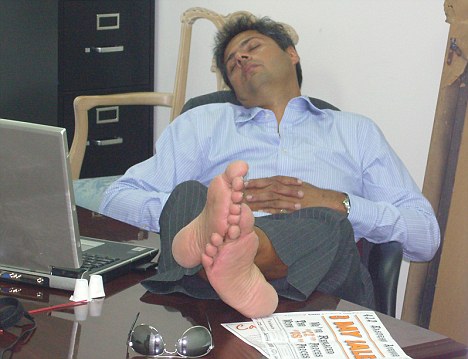
In his story Wright says there is no suggestion that the so-called Sunshine Squad should not have had any leisure time during their stay, financed by the Cayman government. “Yet the photos, which also show 54-year-old Bridger on his motorboat and a barefoot colleague snoozing in the police incident room, will hardly help their cause as the inquests into the fiasco continue,” he writes.
Reporting on Auditor General Dan Duguay’s findings, which were published this week, Wright outlines the hefty bill which SPIT, and in particular Bridger, clocked up during their 18 month stay. (Photo: Dectective Shafquat Ali at work in the offices above Ford Street Market)
“The controversy is hugely embarrassing for the Met as the Sunshine Squad was led by officers from it’s ‘whiter than white’ Directorate of Professional Standards (motto: ‘integrity cannot be compromised’),” Wright reveals in his articl.
He also explains how retired British High Court judge, Justice Sir Peter Cresswell, who conducted a judicial review of the unlawful arrest of Justice Alex Henderson found that Bridger’s team had ‘misled the courts’, made ‘deliberate misrepresentations’, and that their behaviour was ‘arbitrary and unfair’ and ‘reflected the gravest abuse of the process’.
 Wright says the Sunshine Squad consisted of eight officers at any time and that payment approvals for the officers were based on recommendations from Bridger, who when he retired from Scotland Yard, remained in charge of the inquiry for a further 12 months as a Cayman Islands ‘government consultant’ on a hugely-inflated salary until he was kicked off the inquiry in April this year. (Photo: Bridger, Ashiwn and Worthington)
Wright says the Sunshine Squad consisted of eight officers at any time and that payment approvals for the officers were based on recommendations from Bridger, who when he retired from Scotland Yard, remained in charge of the inquiry for a further 12 months as a Cayman Islands ‘government consultant’ on a hugely-inflated salary until he was kicked off the inquiry in April this year. (Photo: Bridger, Ashiwn and Worthington)
Wright also states that John Yates, Assistant Met Commissioner, made five visits to the Cayman Islands and when asked about the AG’s findings, ScotlandYard said it didn’t believe Duguay’s report criticized the Metropolitan police: “We do not accept that the conclusions of the Cayman Islands’ auditor general’s report criticised the Met or the investigative team,” Scotland Yard said. “The criticisms contained within the report were levelled at the Strategic Oversight Group, who were based locally in the Cayman Islands and are entirely separate from the Met. The Met was asked to provide a small team of detectives and police staff to assist the Cayman Islands Government anti-corruption investigation at various times since the investigation started in September 2007. As this inquiry was on behalf of the Cayman Islands Government it was agreed that they would meet operational costs.”
Wright also reported that there was no answer at Bridger’s £500,000 semi-detached home in Surrey as he is believed to be away with his family. CNS was unable to confirm speculation that Bridger is here in Cayman visiting the beachfront condo he allegedly purchased while he was a member of SPIT.
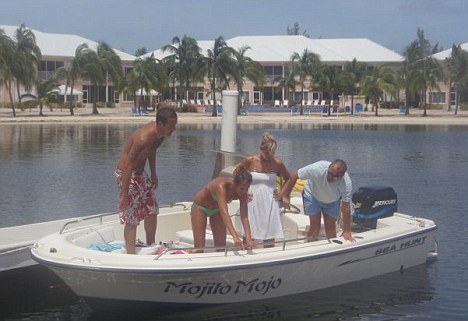
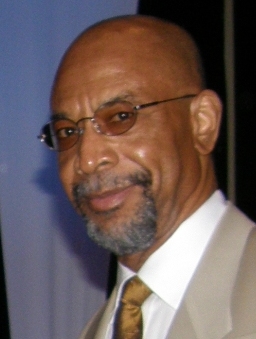
Bridger told oversight committee corruption was rife
 (CNS): Following the shocking revelations by Auditor General Dan Dugauy’s office in the special report concerning the spending on Operations Tempura and Cealt, the former chief secretary has also revealed how those on the oversight committee were told of rampant corruption by the senior investigating officer. Speaking to News 27, George McCarthy revealed that Martin Bridger had made outrageous claims of corruption running riot in the RCIPS, from murder to drug dealing. However, the former top civil servant said the investigation got out of hand.
(CNS): Following the shocking revelations by Auditor General Dan Dugauy’s office in the special report concerning the spending on Operations Tempura and Cealt, the former chief secretary has also revealed how those on the oversight committee were told of rampant corruption by the senior investigating officer. Speaking to News 27, George McCarthy revealed that Martin Bridger had made outrageous claims of corruption running riot in the RCIPS, from murder to drug dealing. However, the former top civil servant said the investigation got out of hand.
He said Bridger told them that there was massive corruption taking place in the Royal Cayman Islands Police Service –“that murders had taken place, that there were people here involved in drug related activities, and all of these things,” he added.
McCarthy was chief secretary when he was asked to chair the oversight committee by Governor Stuart Jack three months after Operation Tempura began, but he said they were not consulted at the beginning and had they been, the advice may have been never to start such an operation.
“It would have been best for this country if this had not gotten to the stage it did,” he said. The former CS explained that the oversight group was supposed to simply advise on what should happen to officers allegedly involved in corruption.
However, during the more than two-year special police investigations, Operation Tempura and latterly Operation Cealt, Bridger did not bring any corruption charges against any police officers with the exception of Deputy Commissioner Rudy Dixon, who eventually went to court regarding a single incident where he was found not guilty of misconduct in a public office and perverting the course of justice. The sole corruption charge that the more than $7millon investigation brought was the accusation that Dixon had ordered the release of Rudy Evans, a former police commissioner after he had been arrested on a DUI. During the trial the court heard that Dixon had advised the officer in charge that evening to release Evans based on local case history and the circumstances of the arrest.
To date there have been no other arrests of police officers and certainly no indication that RCIPS officers have been involved in anyone’s death or dealing drugs.
McCarthy told the television station that the investigations went too far but that the oversight committee could not be held responsible. The governor also has denied any culpability in two statements released since the public circulation of the auditor general’s report. Duguay and his team revealed that by June of this year the Special Police Investigation Team had spent almost $7 million with expectations that the bill will reach around $10 milion before it is over.
Despite the whopping cost to the Cayman Islands public purse and not one single conviction, Jack said in a public statement released by the governor’s office yesterday that Operation Cealt would continue and the operations would be allowed to reach their full conclusions.
Operation Cealt is said to be the part of the investigation in which the specialist consultant firm BGP Training and Consultancy was hired to conduct the interviews and de-briefings of the individuals who came forward with allegations of police wrongdoing and cost $585,700.
However, a number of sources have told CNS that the vast majority of the information collected was merely unsubstantiated rumours that have not been verified. Despite that, however, the governor has insisted that there are serious criminal allegations which are currently being investigated. Following Rudolf Dixon’s trial, SPIT has now been disbanded and the UK Met and ex Met police officers have left the island. The team was finally wound up on 9 October.
According to government sources the Cealt investigation will be conducted by a special internal unit within the RCIPS.
Immigration changes will create jobs for locals
(CNS): In order for Cayman to derive more money from the financial services sector it will need to drop the rollover policy and make immigration laws more attractive to professionals, says the chair of Cayman Finance. Anthony Travers said that roll over policy does not create jobs for Caymanians but removes them. He warned that if Cayman does not enhance the situation for the sector government revenue will depend on tourism and a budget as little as US$150million which would see three quarters of the civil service disappear.
Speaking at an anti-money laundering conference sponsored by Global Compliance Solutions on Thursday at the Grand Cayman Marriot, Travers spelt out the problems of restrictive immigration policies. “There can be no doubt that the application of the roll over policy and the administration of the grant of work permits has had a very negative bearing on the fund administration industry in the Cayman Islands with trickle down negative implications for the real estate industry and job opportunities for Caymanians.”
The need to attract new areas of business in the financial services sector will require attracting new professionals to the island, Travers explained.
“It is highly unlikely in the foreseeable future that the volume of transactional flows willreturn to the levels experienced pre Leman Brothers,” he added. “To maintain both private and public sector revenues, the Cayman Islands Financial Industry must for the reasonably foreseeable future obtain greater revenue from fewer transactions. This in turn means that a more substantial element of each transaction must be undertaken from in and within the Cayman Islands and by those professionals capable of undertaking real financial engineering.”
He said the choice for Cayman was clear cut. In a hypothetical example where the financial industry was taken out of the local economy, Travers suggested, Cayman would be left with an indigenous population of some 27,000 people whose revenue could only be derived from tourism.
“There is absolutely nothing wrong with that as an economic model. Indeed, some people may prefer it and hence the matter is one of choice. But it must be understood that if that is the choice, that model will generate a budget of approximately US$150 million per year and support a civil service that is therefore less than one quarter of its current size.”
If the Financial Industry is not accommodated he warned that young Caymanians can only be prepared for local employment in tourism. If the finance industry is not moving forward with the full support of the Cayman Islands Government then it is moving backwards, he noted. “No financial industry in history has been able to maintain a status quo. And Government revenues from the Financial Industry will necessarily follow either trend -forwards or backwards– it is as simple as that.”
Travers added that the real mechanism for ensuring proper Caymanian integration into the financial services industry is the Immigration Law. He said it was widely accepted that it had not worked satisfactorily and where it had failed to integrate Caymanians into the sector the answer should not be policies which drives fund administration, IT services, law firms and banks back offices out of the Cayman Islands.
He said Cayman Finance was advocating a change to policies that he believed would create more jobs for Caymanians not less. “There is nothing in the recommendations of Cayman Finance with regard to matters of immigration that will not operate in the best long term interests of young Caymanians seeking opportunity in the financial services industry,” Travers vowed but added the country needed to bring back business that had relocated and attract new business especially in the form of fund manager professionals.
Cayman Finance was enjoying a good relationship with the new administration, Travers said, with a substantial improvement in co-operation between the private and public sector, the industry body was providing coherent advice on behalf of the Cayman Islands Financial services Industry through developed channels. “On the key points, our advice is being accepted,” he said adding that Cayman Finance had also endorsed the government 2009/10 budget because a great number of the recommendations were developed by and recommended by the organisation.
Although the chair noted that no one thought the increased fees were compelling in their own right they were far preferable to direct taxes. “If cuts can now be made in public sector expenditure, (they) may represent only a temporary inconvenience,” he said but nothing would have justified "crossing the Rubicon and introducing direct taxation.”

Law firm honours founder
 (CNS): Considered a pioneer and founding father of Cayman’s offshore financial industry the late William Walker will be honoured at one of the islands leading fund conferences next year. The William Walker Memorial Presentation (WWMP) will debut at the fund conference when Staurts the local law firm he helped establish will bring in eminent speakers to discuss the issues facing the industry today. The firm said the WWMP would become a regular part of the conference agenda staring with Andrew Bacevich,who will speak on US imperialism and its effect on international affairs.
(CNS): Considered a pioneer and founding father of Cayman’s offshore financial industry the late William Walker will be honoured at one of the islands leading fund conferences next year. The William Walker Memorial Presentation (WWMP) will debut at the fund conference when Staurts the local law firm he helped establish will bring in eminent speakers to discuss the issues facing the industry today. The firm said the WWMP would become a regular part of the conference agenda staring with Andrew Bacevich,who will speak on US imperialism and its effect on international affairs.
“By honouring the remarkable career of William Walker we hope to renew a sense of pride in the islands and inspire a new generation of leaders to carry the Cayman banner to even greater heights,” said Anthony Akiwumi, Head of Litigation at Stuarts.
The January conference will focus on the challenges surrounding Global Transparency and stuarts Managing Director Andrew Hersant, said the conference has built a strong name for itself within the industry.”We ensure that attendees are provided with first-rate information from high profile speakers. We believe the WWMP will be a vital part of continuing that goal.”

Delay formal lessons to age six, UK review says
 (BBC): Children should not start formal learning until they are six, a review of primary education in England says. Instead the kind of play-based learning featured in nurseries and reception classes should go on for another year, the Cambridge Primary Review says. There is no evidence that an early introduction to formal learning has any benefit, the review says, but there are suggestions it can do some harm. Ministers say a starting age of six would be completely counter-productive. Most children start primary school in England aged four, and a large proportion are taking advantage of free, part-time pre-school places in local schools and privately-run nurseries from the age of three.
(BBC): Children should not start formal learning until they are six, a review of primary education in England says. Instead the kind of play-based learning featured in nurseries and reception classes should go on for another year, the Cambridge Primary Review says. There is no evidence that an early introduction to formal learning has any benefit, the review says, but there are suggestions it can do some harm. Ministers say a starting age of six would be completely counter-productive. Most children start primary school in England aged four, and a large proportion are taking advantage of free, part-time pre-school places in local schools and privately-run nurseries from the age of three.
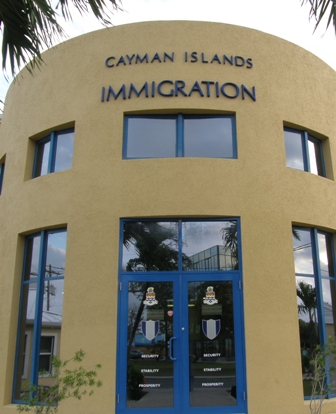
Immigration keeps up pressure on permit offenders
 (CNS): The immigration department said it has arrested a number of employers and employees this month regarding various immigration offences. From one employer who was making an employee pay permit fees to a female foreign national who remains in custody as a result of overstaying in Cayman illegally for the last year, Senior Immigration Officer Jeremy Scott has said people who break any work permit law will be arrested. Scott who is responsible for enforcement operations within the Enforcement and Intelligence Division said labour offences and associated arrests are the focus for this month.
(CNS): The immigration department said it has arrested a number of employers and employees this month regarding various immigration offences. From one employer who was making an employee pay permit fees to a female foreign national who remains in custody as a result of overstaying in Cayman illegally for the last year, Senior Immigration Officer Jeremy Scott has said people who break any work permit law will be arrested. Scott who is responsible for enforcement operations within the Enforcement and Intelligence Division said labour offences and associated arrests are the focus for this month.
“We regularly receive calls about people who go to job sites seeking work. But this can be avoided, for if a business doesn’t have work, it should cancel a permit, or apply for an amendment which would allow the person to legally work elsewhere,” Scott explained.
Illegally sharing guest workers is also an offence, and employees have been arrested on charges of working outside the terms of a permit. In one case, both a restaurant owner and an employee now face charges involving illegal employment over a three-month period and a supervisor was also arrested for providing misleading information.
A construction worker was also found working without immigration authorization on a jobsite and was arrested along with the site supervisor on suspicion of illegal employment.
Immigration investigations are taking place in all sectors of employment, and officials warn that employers in breach of the law can be charged and fined. To avoid such incidents, employers may also terminate permits by sending cancellation letters to the department. Workers may also voluntarily cancel their own permits.
“We appreciate and look forward to the continued support of the public in detecting these cases. We are also using our computer database, which includes photos,” said Deputy Chief Immigration Officer (Enforcement, Intelligence and Asylum) Gary Wong. He urged employers to remember their legal obligation (under Immigration Regulations 2009 Section 9) to cancel permits when work is no longer available. Employers who fail to do so may be prosecuted and face a maximum fine of $5,000.
Employers are also responsible for communicating the status of work permits and applications to their employees.
Another issue of concern is employers who submit renewals for work permits after they have expired. These cases violate Section 56(1), and first-time offenders are liable to a fine of $5,000 and to imprisonment of one year.
Business owners are therefore reminded to submit renewals early, as renewal applications must be submitted before expiration. Section 56 (3) of the law allows continued employment of a staff member while the new permit application is considered, but only if this was submitted within the correct timeframe.
Employers, employees or members of the public may call 949 8344 or visit the offices of the Department of Immigration for more information, or to report suspicious activity. In addition, the Enforcement Division may be contacted directly at 244 2028 or 244 2051.
All information will be treated in the strictest confidence.

Margaritaville armed robbery
 (CNS): UPDATED 11:30 –Police have now confirmed that at around 8:20 this morning the 911 Emergency Communications Centre received a call from an employee of the waterfront restaurant and bar, Margaritaville, stating that they had just been robbed by two men carrying weapons. Officers attended the scene and were told that the men, armed with what appeared to be a hand gun and a knife, entered the restaurant, made their way to the office and demanded cash from one of the employees. After taking an undisclosed amount of cash the suspects left the premises via a rear door that leads on to Cardinal Avenue. No one was hurt during the incident.
(CNS): UPDATED 11:30 –Police have now confirmed that at around 8:20 this morning the 911 Emergency Communications Centre received a call from an employee of the waterfront restaurant and bar, Margaritaville, stating that they had just been robbed by two men carrying weapons. Officers attended the scene and were told that the men, armed with what appeared to be a hand gun and a knife, entered the restaurant, made their way to the office and demanded cash from one of the employees. After taking an undisclosed amount of cash the suspects left the premises via a rear door that leads on to Cardinal Avenue. No one was hurt during the incident.
The employee described the suspects as being in their early twenties, clean shaven, one approximately 5’ 6’’ and the other slightly shorter, both had dark complexions. One was said to be wearing ¾ length jeans and a light coloured vest top. The other wore long baggy jeans and a white and grey polo shirt. Eyewitness accounts also indicate that both had a Jamaican accent.
Anyone with information about the robbery can pass it on to police in a number of ways; people can speak with an officer they know and trust, they can reach George Town detectives on 949-4222, they can leave information on an anonymous voicemail service by calling 949-7777 or they can call Crime Stoppers on 800-8477 (TIPS). All persons calling Crime Stoppers remain anonymous, and are eligible for a reward of up to $1000, should their information lead to an arrest or recovery of property/drugs.
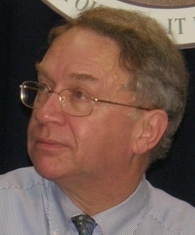
Cealt will continue says Jack
 (CNS): In an effort to defend the discredited special police investigations in the face of widening public criticism and calls for an end to the investigations, Governor Stuart Jack has said the people are “deluding themselves” if they think there is no corruption in Cayman. He said that, though things were not as bad as in the Turks and Caicos Islands, it was wrong to think the country was free of “any corrupt or unethical behaviour in the police or elsewhere in public life” and Operation Cealt would press on. The governor claimed that his intention had only ever been to investigate any serious corruption in the police and to demonstrate determination to set high standards.
(CNS): In an effort to defend the discredited special police investigations in the face of widening public criticism and calls for an end to the investigations, Governor Stuart Jack has said the people are “deluding themselves” if they think there is no corruption in Cayman. He said that, though things were not as bad as in the Turks and Caicos Islands, it was wrong to think the country was free of “any corrupt or unethical behaviour in the police or elsewhere in public life” and Operation Cealt would press on. The governor claimed that his intention had only ever been to investigate any serious corruption in the police and to demonstrate determination to set high standards.
“I believe that is in the interests of good governance and ultimately, of the well-being of this community. That remains true of the ongoing Operation Cealt, which is looking into some allegations of very serious criminality.”
In a long statement the governor ponders why the public turned against Tempura and suggests that the length and cost have contributed to the “anti-Tempura atmosphere” as well as the impact on Cayman’s reputation. He suggests that people believe it is biased against Caymanians or a UK conspiracy, which he dismisses as ludicrous.
What the governor does not mention in his ruminations is the fact that SIO Martin Bridger unlawfully arrested a high court judge; that Bridger was paid more than $500,000 with no results; that within the first three days of the special police investigation team arriving they were accusing the police commissioner of being involved in a burglary that never happened; that they rejected rulings by the chief justice, the highest legal authority in Cayman; and that they took advice from lawyers who did not know Cayman law — among other things.
The governor said he believed some who were criticising Tempura were really seeking independence so they should come out and say so. He also indicated that the UK would not allow Caymanian politicians to control the police.
“The National Security Council under the new Constitution will give the people of the Cayman Islands more say over the strategies and policies adopted by the RCIPS. But the UK was rightly not prepared to give politicians in Cayman or in any other Overseas Territory, control over police operations or the appointment of senior police officers …”
Although Jack said he accepted overall responsibility for the police and the investigations, the governor does not have operational control and his role is to support the decisions, he claimed. "I supported the-then Commissioner of Police when he invited in the Metropolitan Police in 2007. I continue to support the ongoing efforts under the present Commissioner,” he said, but made no comment regarding his dismissal of Stuart Kernohan or the continued suspension of Rudolf Dixon, the deputy commissioner who was cleared of all charges by a jury in the third failed court case brought by Operation Tempura.
Not for the first time this week the governor sought to shift blame for the mistakes and the costs of these special police investigations. “Wherever I have had to take a decision linked to these investigations, I have sought local legal advice and consulted more widely. I have, on many occasions, queried why the investigations have taken so long and have urged care over the cost. However, I do not hold the purse strings,” he claimed. Conversely, the governor noted he had used his reserve powers to take money from the Cayman purse to pay when the government refused to vote the funds in the last budget appropriation for the special police investigation team (SPIT.
He denied deciding the contractual terms on which the government hired the services of the Tempura and Cealt investigators and suggested that he was not all powerful, as under the Public Management and Finance Law the governor has no spending powers. He said chief officers working with budgets approved by the Cabinet – which in practice means the elected Ministers – and ultimately by the Legislative Assembly hold government purse strings. It was not clear whether that comment was meant to convey that the elected arm of government was therefore responsible for the spending by SPIT.
“The governor is not in practice all-powerful,” he said. “On the contrary. He is generally expected under the Constitution to accept the advice of Cabinet whether or not he personally agrees with it.”
He said that the many twists and turns of Operation Tempura were not predictable, and while he acknowledged that some mistakes were made they were not as many as the critics have claimed.
“I remain unable to say as much as I would like about Operations Tempura and Cealt for legal reasons. I must not prejudice ongoing investigations into … some serious matters,” the governor claimed. “Nor must I prejudice ongoing legal proceedings. That is in part to protect the Cayman Islands from further expensive legal liabilities and in part to protect civic-minded people who have bravely come forward with information. I look forward to the day when the whole story can be told.”
In the meantime he said during his last few weeks as governor he would continue to carry out his constitutional responsibilities. He also stated that he had received some support from the individual members of the public who had come up to him and encouraged him not to be put off by certain politicians, or comments on the talk shows and in anonymous blogs.
Despite the growing calls from politicians and the public at large and the overwhelming sentiment that the investigations need to end and Cayman should be issued with a clean bill of health, Jack said to get to there the process had to be seen through to its conclusion.
In a recent announcement in the Legislative Assembly Ezzard Miller, the independent member for North Side, has vowed to bring a private members motion to the floor of the House to debate the possibility of the Cayman government suing the governor and the UK over the investigations. CNS understands that the motion has been accepted into the legislative business by the speaker and could be debated next Thursday.

Legal aid
The Criminal Defence Bar Association represents criminal defence lawyers who work in the criminal courts of the Cayman Islands. Needless to say we support any proposal which broadens access to justice for those of limited means.
On Monday night, the Government pushed through a motion which will fundamentally change the allocation and provision of legal aid to those who cannot afford it.
No-one, not even the Government’s own legal advisor, the Attorney General, appears to have been forewarned. The far-reaching proposal was made and passed apparently without any notice to the opposition or any consultation with key stake holders such as the Chief Justice, the judges and magistrates of our criminal courts, the Attorney General, the Law Society, the Criminal Bar Association, the Clerk of the Court, the Human Rights Committee, or our own organisation.
The proposed reform appears to create an entity called the ‘legal aid office’ which is a mixture of a public defender’s office and legal advice clinic. The people of the Cayman Islands should be aware that such a proposal is entirely contrary to the advice of the Government’s own legal advisory body, the Law Reform Commission. In 2007 that Commission was directed by the Government to conduct a substantive review of the legal aid system in the Cayman Islands. After significant and exhaustive consultation, in July 2008 the Law reform Commission reported back to Government that:
“While the Commission agreed that the containment of excessive legal aid costs is in the public interest the Commission considered that the present system of provision of legal aid services by the private bar in general offers good value for money.
"A public defenders scheme would involve significant expense, going beyond just the salaries of the lawyers, to include secretaries and paralegals expenses which the private practitioners must currently assume as part of their own costs of doing business. The current legal aid system, the judicare model, provides a high calibre of service and is far less expensive ultimately than a public defender’s scheme.
"A Legal Aid clinic would not be appropriate to provide defence in criminal cases."
Plainly, any suggestion that the LRC’s Report supports the Government’s new proposal is wrong. The full report A Review of the Legal Aid System in the Cayman Islands can be read on the Legislative Assembly website.
Whilst we have not yet been provided with any of the proposed detail of the new scheme and it is, therefore, very difficult for us to comment upon an unknown commodity, we understand that the new office will be offering defence in criminal cases, advice and representation on labour law matters, landlord and tenant disputes, gender violence, family law, immigration issues and general civil advice. Whilst we applaud the commitment to offer free legal advice to a broader cross section of matters, we cannot fathom how the objectives are achievable on the figures which have been suggested in the media.
Crucially, we fear that as a result of these reforms, the standard of representation for those accused of grave crime will suffer, scrutiny of the police and prosecution will be undermined, and the innocent will be placed at greater risk.
Particularly alarming is the transfer of the administration of legal aid funding away from the Chief Justice to the Executive. The administration of criminal justice by an independent judiciary is the cornerstone of a civilised society and democratic first-world nations. The provision of high calibre representation for those accused of grave crime is a front-line service. This reckless reform damages the reputation of these Islands, and the consequences naturally extend beyond those who are directly working in, or are affected by, our criminal justice system.